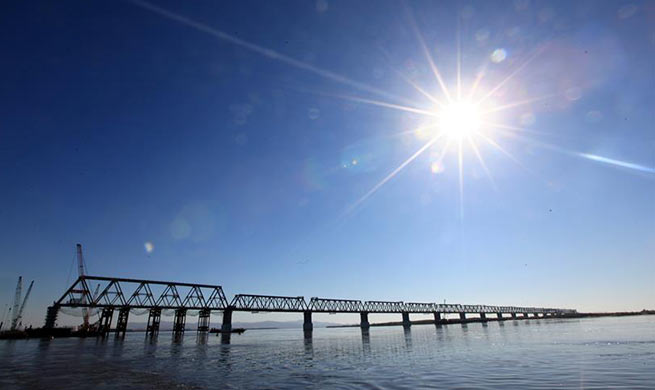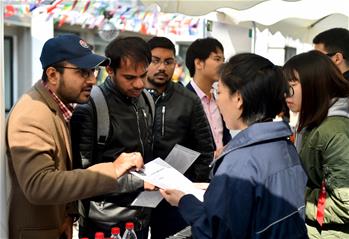ANKARA, Oct. 14 (Xinhua) -- A Turkish court's decision to release U.S. cleric Andrew Brunson will contribute to bilateral ties between Ankara and Washington, but there are other disputes that will hinder full normalization of ties, local experts said.
Taking account of the fact that a "source of tension" which have been blocking diplomacy between Turkish President Recep Tayyip Erdogan and U.S. President Donald Trump is eliminated, release of the pastor will contribute to the bilateral ties, Burhanettin Duran, head of the Ankara-based think tank Foundation for Political, Economic and Social Research said.
A court in Izmir on Friday afternoon sentenced evangelist pastor Brunson to jail for three years and 45 days over terror-related charges, but set him free as he had been jailed since December 2016.
The cleric was accused of terror-related charges and espionage, facing up to 35 years in prison.
This case had more political meaning over its judicial dimension, according to Duran.
He noted that on the side of the U.S., President Trump will now be able to present release of the pastor to his evangelist voters as a "success" for the upcoming midterm congressional elections in November.
"However, many problems that have caused strain between Turkey and the U.S. are still existing," Duran added.
He recalled the situation of Hakan Atilla, deputy general manager of state-owned Halkbank sentenced by an American court on charges of violating U.S. sanctions against Iran and money laundering.
Duran also mentioned Ankara's complaint over delay on Manbij deal with the U.S. which envisages retreat of Syrian Kurds from the northwestern Syrian province.
He noted the U.S. is still supporting the Kurdish People's Protection Units in northern Syria, a group which Turkey sees as Syrian branch of the outlawed Kurdistan Workers' Party.
The expert recalled a U.S. Senate decision to block delivery of F-35 jets to Turkey due to the latter's purchasing of the S-400 air defense system from Russia.
The new U.S. sanctions against Iran that will take effect in early November could also be a source of tension between Washington and Ankara as Turkey has significant trade ties with Tehran.
The court ruling will have implications on both Turkey's and the U.S. domestic politics, bilateral ties of the two countries and Turkey's economy, according to Burak Kuntay, international relations expert from Bahcesehir University.
As evangelists have grassroots on some states in the U.S., the Republicans will gain support in these ballot after Brunson's release, Kuntay said.
A perception that release of the 50 years-old pastor will resolve the entire Turkish-U.S. disputes in political arena will be misleading because the two NATO allies will face other hurdles in bilateral relations in the upcoming period, he said.
Turkey and the U.S. have no major common interest at the moment that will cement their alliance.
"Since the Cold War, they are out of common interests," Kuntay added.
The case of Brunson was at the heart of disputes in Ankara-Washington ties, as the latter slapped Turkey in August sanctions on two Turkish ministers and doubling tariffs on aluminum and steel imports from Turkey.
Ankara then retaliated by raising tariffs on U.S. imports and boycotting U.S. made goods, sparking one of the worst diplomatic rows between the NATO allies.
The row has triggered further loss in the value of the Turkish currency, as Turkey is facing economic woes including huge debt and high inflation.
The U.S. attempts for the release of Brunson have intensified ahead of congressional elections in November. Instead of previous exchange of harsh words, the two capitals recently remained silent on the case of bilateral relations.
Erdogan told reporters this week, when asked about Brunson, that he would "respect whatever the decision the judiciary gives."
The Turkish court's decision comes at a time when Turkey's financial markets have certainly been alarming.
In September, Turkish government stepped up measures against its currency weakness which aggravated Turkey's persistent inflation problem.
Turkish markets were closely following the outcome of the pastor's hearing as its economic parameters are very much tuned to developments in the U.S.
The Turkish lira started surging on Thursday, one day before Brunson's hearing in the wake of reports which said the U.S. pastor would likely be released.
The U.S. media reported that the two countries reached a deal during meetings last month at the United Nations General Assembly gathering in New York.
These reports have influenced the local markets. The Turkish Lira has already been gaining in recent days and the exchange rate of lira against dollar has broken the crucial 6.00 barrier.
Turkish financial markets will enjoy a "short term relief" after the Brunson's release, according to Murat Sagman, economy instructor at Bilgi University.
Yet, the local markets will still be closely following developments in bilateral ties and remain volatile to any tensions on political disagreements, the expert pointed out.
















